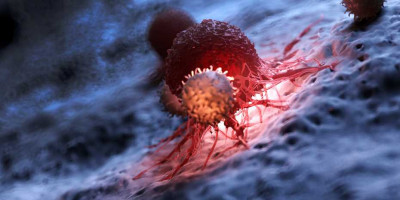
Modern immunotherapies boost the body's own defences against cancer.
They activate killer T cells of the immune system that can specifically recognise and destroy cancer cells.
In many patients, however, cancer cells adapt and become invisible to killer T cells so that the treatment is no longer effective.
An interdisciplinary team of researchers from Magdeburg has now discovered a new mechanism that enables the immune system to also eliminate such invisible cancer cells.
These findings open up new possibilities for the development of improved cancer immunotherapies.
The results have now been published in the renowned journal Nature.
"In our work, we have been looking for strategies to target such cancer cells that are "invisible" to killer T cells. In doing so, we came across the special abilities of the so-called helper T cells," says Prof Dr Thomas Tüting, Professor of Dermatology at the University Hospital Magdeburg and leader of the study team.
Using an experimental cancer model, the researchers observed that a small number of helper T cells can eradicate advanced cancers as effectively as a much larger number of killer T cells.
The helper T cells were also able to eliminate cancer cells that had become invisible to killer T cells.
Using cutting edge microscopy techniques to study immune cells in living cancer tissue revealed that helper T cells behave fundamentally differently from killer T cells: "Killer T cells penetrate into cancer tissues and interact directly with cancer cells, while helper T cells are mainly found at the edge of cancer tissues, where they exchange signals with other immune cells," says Prof Dr Andreas Müller from the Institute of Molecular and Clinical Immunology at the University of Magdeburg.
Further investigations revealed that helper T cells secrete chemical mediators that attract scavenger cells of the immune system and induce them to support the destruction of cancer cells on their behalf.
Together, these two cell types can effectively fight bacterial and viral infections.
Their cooperation can also be exploited to mobilise the full arsenal of immune defence against cancer cells.
In search for the underlying mechanisms of action, the researchers found that the interaction between helper T cells and scavenger cells enhances their ability to release inflammatory mediators which act remotely to drive cancer cell death, as if they were infected by a pathogen.
Exactly how this happens is still not completely understood, and the significance of this mechanism for cancer immunotherapies will have to be elucidated.
The research results reveal a mechanism how the ability of the immune system to defend against the spread of pathogens in the body can be utilised to destroy cancer cells.
Based on these findings, the researchers in Magdeburg are developing new strategies for cancer immunotherapy that are also effective in patients with cancers that have become invisible to killer T cells.
Article: CD4+ T cell-induced inflammatory cell death controls immune-evasive tumours
We are an independent charity and are not backed by a large company or society. We raise every penny ourselves to improve the standards of cancer care through education. You can help us continue our work to address inequalities in cancer care by making a donation.
Any donation, however small, contributes directly towards the costs of creating and sharing free oncology education.
Together we can get better outcomes for patients by tackling global inequalities in access to the results of cancer research.
Thank you for your support.